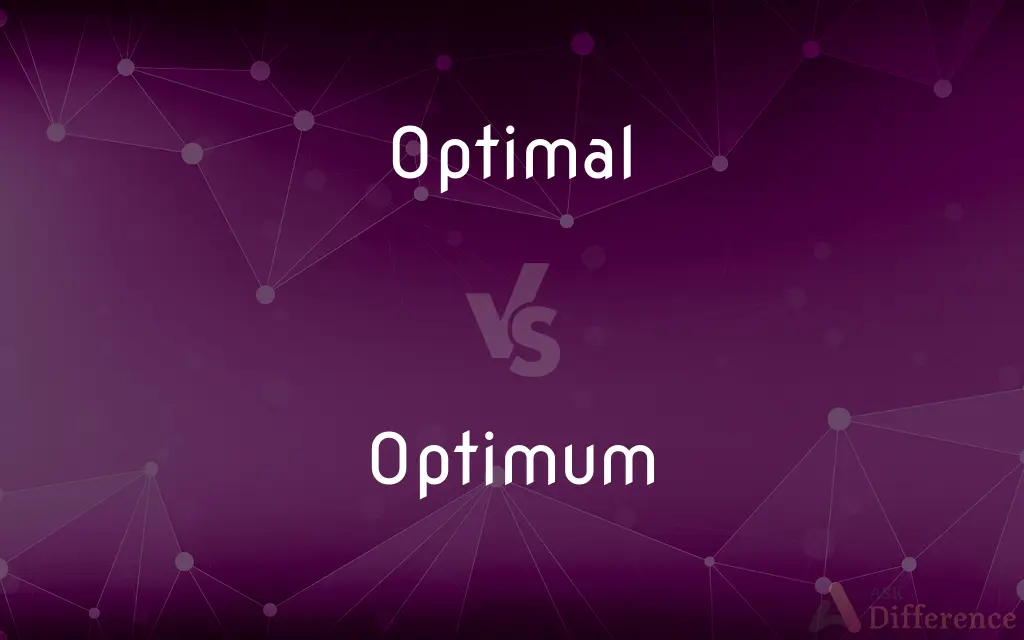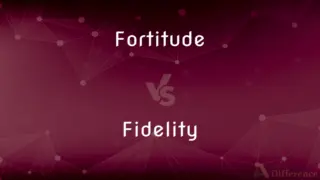Optimal vs. Optimum — What's the Difference?
By Tayyaba Rehman — Updated on November 2, 2023
Optimal describes the most favorable conditions for a given purpose, while optimum is the most favorable point or degree.

Difference Between Optimal and Optimum
Table of Contents
ADVERTISEMENT
Key Differences
Optimal refers to the best possible outcome or condition, often used in a broad sense and can be subjective. For example, the optimal level of exercise for health varies per individual. Optimum is used for the singular best state or condition, such as the optimum temperature for growing tomatoes.
Optimal conditions may vary according to different criteria or situations, such as optimal investment choices differing between investors. Optimum denotes a peak or a precise point where conditions are most conducive for a specific outcome, like the optimum pH level for a chemical reaction.
The term optimal is often used when discussing scenarios where multiple factors lead to the best result, like in optimal game strategies. Optimum, however, is frequently used in scientific contexts where a single variable is at its best possible level, as in optimum nutrient concentrations.
Optimal can describe the best level of performance under certain constraints, such as an optimal speed limit for safety and efficiency. Optimum points to an exact value or condition that yields the best possible result, like the optimum amount of sleep for cognitive function.
In practical applications, optimal solutions often require balancing trade-offs, like finding the optimal balance between quality and cost in manufacturing. Optimum suggests a precise balance has been achieved, as in the optimum mix of ingredients in a recipe.
ADVERTISEMENT
Comparison Chart
Usage
Describes the most favorable condition among various criteria.
Describes the best possible state or degree in a specific aspect.
Context
Often used in a broader, more general context.
Typically used in scientific and specific contexts.
Flexibility
Can be subjective and adaptable to situations.
Generally refers to a precise point or value.
Grammatical Form
Used as an adjective.
Used as a noun and an adjective.
Evolution
Derived from optimizing processes or scenarios.
Represents the highest point of an already optimized state.
Compare with Definitions
Optimal
Relating to the best or most effective possible action.
Finding the optimal solution required complex calculations.
Optimum
The greatest degree reached or achievable.
The athlete's training is designed to bring her to her optimum.
Optimal
Most favorable under the given circumstances.
To achieve optimal health, regular exercise is important.
Optimum
The point at which a variable achieves the best result.
The engineers determined the optimum angle for the solar panels.
Optimal
Ideal for a particular purpose or system.
The optimal temperature for yeast fermentation is around 75°F.
Optimum
The most favorable conditions or level for growth, reproduction, or success.
Plants grow best at the optimum soil pH.
Optimal
Reflecting the most advantageous combination of factors.
The optimal diet varies from person to person.
Optimum
The best or most favorable point.
He works at his optimum when he has a clear schedule.
Optimal
Denoting the point at which a condition is most beneficial.
She runs at an optimal pace to increase her endurance.
Optimum
The point at which the condition, degree, or amount of something is the most favorable.
Optimal
Most favorable or desirable; optimum.
Optimum
(Biology) The most favorable condition for growth and reproduction.
Optimal
The best, most favourable or desirable, especially under some restriction.
Finding the optimal balance between features and price is a common problem.
Optimum
Most favorable or advantageous; best.
Optimal
(artificial intelligence) Describing a search algorithm that always returns the best result.
Optimum
The best or most favorable condition, or the greatest amount or degree possible under specific sets of comparable circumstances.
Optimal
The best of its kind
Optimum
The best or most advantageous; surpassing all others.
Optimum conditions for climbing
Optimal
Best possible; most desirable; optimum; as, the optimal concentration of a drug.
Optimum
Best possible or most desirable; - usually under a restriction expressed or implied; as, an optimum return on capital; optimum concentration of a drug; an optimum result.
Optimal
Most desirable possible under a restriction expressed or implied;
An optimum return on capital
Optimal concentration of a drug
Optimum
The most favorable condition, greatest degree, or largest amount possible under given circumstances.
Optimum
Most favorable condition or greatest degree or amount possible under given circumstances
Optimum
Most desirable possible under a restriction expressed or implied;
An optimum return on capital
Optimal concentration of a drug
Optimum
The most favorable outcome of a process or an equation.
The experiment was conducted at optimum light conditions.
Common Curiosities
Can optimal and optimum be used interchangeably?
They are often used interchangeably but can have distinct nuances.
Is optimum always singular?
No, it can be plural (optima) when referring to multiple best points.
Is there an optimal level of something for everyone?
Not necessarily, as what is optimal can vary between individuals.
Can a situation have multiple optimal solutions?
Yes, depending on the criteria being optimized.
Is the optimum always achievable?
Not always; real-world constraints can prevent reaching the optimum.
Can optimal refer to multiple things?
Yes, it can refer to several conditions being favorable.
Are optimal and optimum objective or subjective?
Optimal can be subjective; optimum is usually more objective.
Why might the optimum not be the goal in social policy?
Social policy may aim for fairness over the absolute best outcome.
Is optimal or optimum used more commonly?
Optimal is more commonly used in general language.
How is the optimum used in economics?
It refers to the point at which market efficiency is maximized.
Can a decision be optimal in the short term but not in the long term?
Yes, optimal decisions can vary with the timeframe considered.
How do you determine the optimum condition in a scientific experiment?
Through repeated trials and analysis of results.
Can something be less than optimal but still good?
Yes, optimal is best, but many levels below can still be good.
Does technology aim for optimal or optimum performance?
Technology aims for optimal performance within design constraints.
Do optimal conditions remain constant over time?
They can change with circumstances and new information.
Share Your Discovery

Previous Comparison
Dyslexia vs. Lysdexia
Next Comparison
Fortitude vs. FidelityAuthor Spotlight
Written by
Tayyaba RehmanTayyaba Rehman is a distinguished writer, currently serving as a primary contributor to askdifference.com. As a researcher in semantics and etymology, Tayyaba's passion for the complexity of languages and their distinctions has found a perfect home on the platform. Tayyaba delves into the intricacies of language, distinguishing between commonly confused words and phrases, thereby providing clarity for readers worldwide.
















































